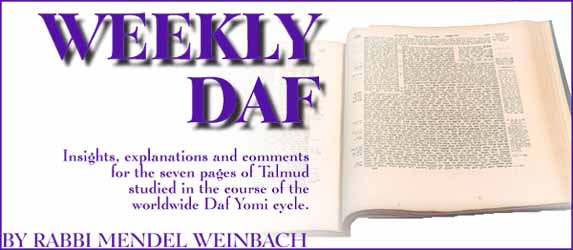Weekly Daf #20

Bava Metzia 2 - 8 - Issue #20
14 - 20 Tammuz 5754 / 23 - 29 June
1994
14 - 20 Tammuz 5754 / 23 - 29 June 1994
This issue is dedicated in the memory of Samuel and Fannie Goldberg O.B.M.
This publication is also available in the following formats:
![]()
![]()
![]() Explanation of these symbols
Explanation of these symbols
Power of an Oath
| The Case: | A person is entrusted with guarding an animal for its owner. When the owner comes to claim the animal the guardian claims that it was stolen through no fault of his. The owner brings him to the Beit Din (court) where he is required to take several oaths to prove his innocence. One of these oaths is a solemn declaration that the animal is no longer in his possession. |
| The Reason: | The Beit Din suspects the guardian of having an interest in the animal he was watching and therefore appropriating it for himself by making up a lie about its being stolen. Faced by the need to take an oath it is expected that he will admit the truth. |
| The Problem: | If we suspect a person of being dishonest enough to appropriate someone else's property why don't we likewise suspect that he will swear falsely in order to achieve his objective? |
| The Answer: | The assumption is that there is a greater fear of violating the command against taking a false oath than there is of taking someone else's property. When the commandment of "you shall not take My Name in vain" was spoken at Sinai as one of the Ten Commandments the entire universe trembled. It is this awe which remains part of the human psyche and enables the court to use an oath as a means of forcing a defendant to tell the truth. |
Bava Metzia 6a
The Selfish Sinner
No person sins for another's benefit.
This principle of human psychology finds expression in the following legal dilemma and its resolution:
| The Rule: | An ordinary shepherd is not eligible to testify in court as a witness because he is suspect of leading his sheep to graze on other people's property, thus rendering him a thief who is disqualified from serving as a witness in court. |
| The Problem: | How do we ever entrust our animals to a shepherd when by doing so we "put a stumbling block in his path" by enabling him to commit a sin of dishonesty? |
| The Answer: | A shepherd is suspect of sinning only when he is tending his own sheep and stands to gain from his dishonesty. He is not suspect of committing this same crime when he is in charge of other people's cattle because "no person sins for another's benefit." |
Bava Metzia 5b
General Editor: Rabbi Moshe Newman
Production Design: Lev Seltzer
HTML Design: Eli Ballon
© 1994 Ohr Somayach International - All rights reserved. This publication may be distributed to another person intact without prior permission. We also encourage you to include this material in other publications, such as synagogue newsletters. However, we ask that you contact us beforehand for permission, and then send us a sample issue.
This publication is available via E-Mail
Ohr Somayach Institutions is an international network of Yeshivot and outreach centers, with branches in North America, Europe, South Africa and South America. The Central Campus in Jerusalem provides a full range of educational services for over 685 full-time students.
The Jewish Learning Exchange (JLE) of Ohr Somayach offers summer and winter programs in Israel that attract hundreds of university students from around the world for 3 to 8 weeks of study and touring.
Ohr Somayach's Web site is hosted by TeamGenesis
Dedication opportunities are available for Weekly Daf. Please contact us for details.






